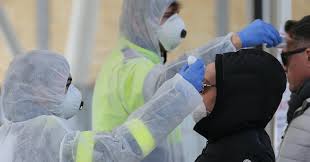Italy: Easing pressure on hospitals

Alessandria: An Italian city at the epicentre of the coronavirus pandemic is asking its highest-risk residents to undergo drive-through COVID-19 checks.
The northwestern city of Alessandria is holding a trial run of drive-thorugh testing on people from the relative safety of their cars, as the country desperately looks for ways to ease the enormous strain on its healthcare system.

Health workers in white protective suits and goggles walk up to drivers and gently insert a swab high up a person’s nose.
The procedure is delicate and takes a few moments. Some drivers initially recoil at the shock.
“Don’t move and everything will be fine,” one of the nurses says to a slightly alarmed-looking driver.”You will have the results in a few days.”
Five reasons why the coronavirus hit Italy so hardIn the United States and South Korea, people queued for hours in their cars to get tested for the virus this way.
“In Korea, people volunteered to be tested, but here it works differently: those who need to be tested are called in,” the pop-up centre’s nursing coordinator Calogero Volante said.
“Only those who are summoned can come.”The city finds itself near the heart of the Italian outbreak, which that has officially infected 110,000 and killed more than 13,000 people.
The Piedmont region, which includes Alessandria, has recorded 886 deaths in the past month.
However, officials have cast doubt on the data and many think the real toll could be at least twice as high.
Italy entered a national lockdown three weeks ago that will run at least until mid-April in an effort to stop the spread.
But a range of people – from rubbish collectors and shop workers to police officers and care home staff – still risk their lives every day by showing up for work.
Italy would like to see all of them tested, for their own safety and the safety of those they meet. But the overstretched country’s resources are already limited.
Officials in Alessandria figured that what worked in the United States and South Korea might work in Italy as well.
Italy’s infection rates are slowing and hopes are rising high that the country has already seen the worst.
But officials are now thinking about how they are ever going to reopen the country without sparking a new wave of infections.
Comprehensive testing is almost certainly going to be part of any back-to-work scheme, and the drive-through project in Alessandria might eventually be reproduced across Italy – if it works.
“Here, we are able to test up to 60 people a day, testing every five minutes,” said Volante.
“It frees up human resources — and above all, the protective equipment.”





